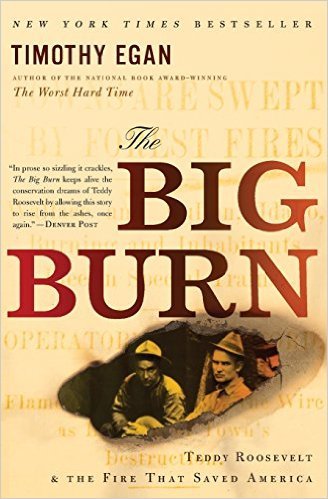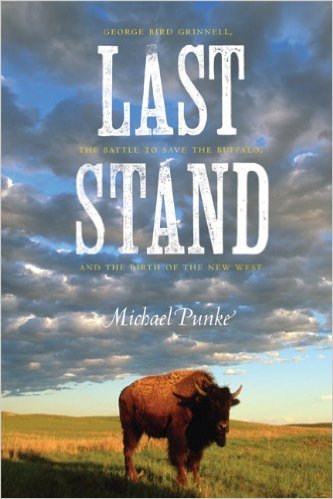Had a lot of travel time and tent time the last month, which allows me to catch up on some reading. Found two books that are really good if you are interested in the manner in which conservation became a part of the American ethos.
First is The Big Burn by Timothy Egan. It is about how Roosevelt and Pinchot started the US Forest Reserves and how the Big Burn of ID and MT in 1910 almost sunk the idea that America would be this new place, differentiated by other countries by the fact that we would have large tracts of public lands for both resources and conservation.

Amazon link here - http://www.amazon.com/gp/product/05...IN=0547394608&linkCode=xm2&tag=onyouownadv-20
The other is Last Stand by Michael Punke. This is about George Bird Grinell, who might be the most under-appreciated of the early conservation pioneers. His time in the west was a bit before Roosevelt and Pinchot got the public land movement going, but he was one of the first to write lengthy reports about the massive waste of market shooters decimating the wildlife of the West.
Though it was bison that drove home the point to Grinell, he saw it happening with other species. Hist trip to Yellowstone National Park, one of the first to see the park after being established as a national park, and seeing the vanishing wildlife at the hands of poachers really set him on a path to advocate for all wildlife.

Amazon link here - http://www.amazon.com/gp/product/08...IN=0803226802&linkCode=xm2&tag=onyouownadv-20
I've always been intrigued by how the original pioneers of conservation in America were from great wealth, yet fought their battles for public land and conservation of our wild animals under the premise of doing it for the average person, or as they called it at the time, The Common Man.
Whatever the reasons, it is interesting to read the politics of the time, the characters involved, and some of the techniques these people used to convince Americans that they did not want to be like Europe. Europe was used as a convenient whipping post by these folks to show what they did not want America to be. Wonder if the acceptance by Americans was a true desired for wild lands and abundant wildlife; or was it an anti-Europe sentiment that was popular at the time.
Anyhow, these are two good books if you are a history guy who is looking for more understanding of how we got these public lands and how the battle was fought to start the wildlife recovery hunters are known for today.
Make no mistake, the three men mentioned above were first and foremost hunters. All three of them were founders of the Boone and Crockett Club.
Anyone have some other good non-fiction they've read lately?
First is The Big Burn by Timothy Egan. It is about how Roosevelt and Pinchot started the US Forest Reserves and how the Big Burn of ID and MT in 1910 almost sunk the idea that America would be this new place, differentiated by other countries by the fact that we would have large tracts of public lands for both resources and conservation.

Amazon link here - http://www.amazon.com/gp/product/05...IN=0547394608&linkCode=xm2&tag=onyouownadv-20
The other is Last Stand by Michael Punke. This is about George Bird Grinell, who might be the most under-appreciated of the early conservation pioneers. His time in the west was a bit before Roosevelt and Pinchot got the public land movement going, but he was one of the first to write lengthy reports about the massive waste of market shooters decimating the wildlife of the West.
Though it was bison that drove home the point to Grinell, he saw it happening with other species. Hist trip to Yellowstone National Park, one of the first to see the park after being established as a national park, and seeing the vanishing wildlife at the hands of poachers really set him on a path to advocate for all wildlife.

Amazon link here - http://www.amazon.com/gp/product/08...IN=0803226802&linkCode=xm2&tag=onyouownadv-20
I've always been intrigued by how the original pioneers of conservation in America were from great wealth, yet fought their battles for public land and conservation of our wild animals under the premise of doing it for the average person, or as they called it at the time, The Common Man.
Whatever the reasons, it is interesting to read the politics of the time, the characters involved, and some of the techniques these people used to convince Americans that they did not want to be like Europe. Europe was used as a convenient whipping post by these folks to show what they did not want America to be. Wonder if the acceptance by Americans was a true desired for wild lands and abundant wildlife; or was it an anti-Europe sentiment that was popular at the time.
Anyhow, these are two good books if you are a history guy who is looking for more understanding of how we got these public lands and how the battle was fought to start the wildlife recovery hunters are known for today.
Make no mistake, the three men mentioned above were first and foremost hunters. All three of them were founders of the Boone and Crockett Club.
Anyone have some other good non-fiction they've read lately?




